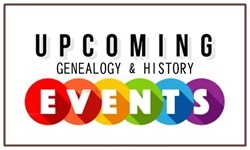7 Traits that Make a Good Genealogist
If you don’t like the idea of wandering a cemetery for hours, or spending a day in the archives, or if you hate the smell of old books … let me tell you that family history just isn’t for you. So can I suggest you take up photography, hiking, woodwork, scapbooking or knitting instead.
However for those that think the above is a perfect day out … welcome to “the tribe”. You are a fellow totally obsessed genealogist, and there’s nothing wrong with that. Nothing at all. We feel at ease with fellow genies, as they are part of our ‘tribe’. They ‘get’ us, and don’t eyeroll like the other family members. But what brings us together is our similarity in certain traits. Here’s just a collection of 7 main ones.
HAVE PATIENCE – Sitting in a library or archive and scrolling through microfiche, or paging through old record books is not for everyone. But a good researcher will know that you might be there for a day or two (or more), before your find who you’re looking for. That one person you’ve been hunting for years. And some days you don’t find them at all. Family history IS NOT a quick hobby. I know many people who have been been researching for 20, 30, 40 or more years. You may spend days, weeks or years looking for one person … and of course frustration sets in, but when you find them you’re on cloud 9 for a year!! Your patience finally paid off.
GET ORGANISED – This is a great trait to have, but it’s not one that comes naturally to many of us. When you start researching you will experience what is known as the “paperwork snowball”. Paperwork is everywhere, notes, documents, printouts, photos and more … and it seems to breed. But having all this useful information and tidbits is only useful if the relevant information is findable and retrievable quickly. In saying that, I know many, many people who have ‘the pile’. This is one that usually on the office floor and has paperwork stacked as high as the desk. It’s great that it is sort of in one place, but you have to agree it really isn’t retrievable. So why not make an hour each week to work on ‘the pile’, and you might be surprised at how quickly it goes down, not to mention what you might find in the pile that you’d forgotten about. And of course then there’s the digital filing too (emails, scans, photos, downloads … ).
QUESTION EVERYTHING – Be a detective and question everything. A good practice is not to accept a piece of evidence until you have it verified from 2-3 different sources. Names, dates, places … query everything. The how, the why, there where. The more you question and look for more sources to verify what you have, the better researcher you’ll be. Also look for the original records, not just at the indexes.
HAVE DETERMINATION – This could also be labelled as persistence or stubborness is what it comes down to. When we are after that clue that piece something together, we are stubborn, and keep researching. As per point 1, patience is also needed here, but ultimately you’ll find your answer if you stick with it.
SELF-EDUCATION – This one is really important, but probably not one that gets the credit it deserves. This can include going to seminars or conferences, watching YouTube videos (genealogy related ones!) or webinars, listening to any number of the genealogy podcasts, doing an online (or offline) genealogy course, or simply reading. Read books, read blogs, read genie mags … it is a great way to learn, and help yourself get self-educated. In essence the more you learn, the better researcher you’ll be.
BE POLITE – I shouldn’t have to mention this one, but I know I do. Be polite and courteous in your dealings with people online as well as those offline. Others do want to help you, but they won’t if you’re rude and demanding.
BE ETHICAL – When you get into family history, without a doubt you will find out some family secrets, many of which other family members don’t know. While it’s good to record these in your private tree, you shouldn’t broadcast these details to the world, as in many cases it can have huge ramifications, and it’s not your job to blurt it out. So ethics are required, and you just need to tread carefully.
I think of my fellow genie friends near and far, and I recognise so many of the above traits in them, as well as myself. So if you wanting to be a better genealogist, practice the above and I guarantee you will improve your research. I know there are more, and feel free to add your suggestions as a comment below.





A great blog Alona.I couldn’t agree more.
I love this post Alona. Agree with all these traits.
CONGRATULATIONS! Your blog has been included in INTERESTING BLOGS in FRIDAY FOSSICKING at
https://thatmomentintime-crissouli.blogspot.com/2019/11/friday-fossicking-nov-1st-2019.html
Thank you, Chris
Hi Alona
I am on the Committee of the Lake Macquarie Family History Group Inc.
I have just read your comment on “7 Traits that Make a Good Genealogist” and wondered if the Group could put it into our next Journal please?
Of course, you would be acknowledged as the author with whatever you thought was appropriate to write about yourself.
It would not appear until 2020 as the last Journal for 2019 has just been distributed.
If you wish, please reply to my email address.
Sincerely
Carole Berman